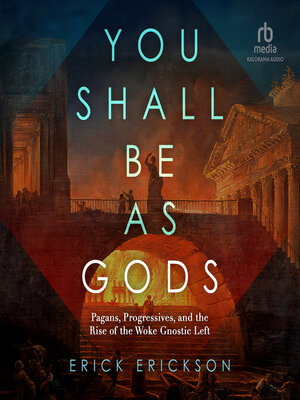You Shall Be as Gods
audiobook (Unabridged) ∣ Pagans, Progressives, and the Rise of the Woke Gnostic Left
By Erick Erickson

Sign up to save your library
With an OverDrive account, you can save your favorite libraries for at-a-glance information about availability. Find out more about OverDrive accounts.
Find this title in Libby, the library reading app by OverDrive.



Search for a digital library with this title
Title found at these libraries:
| Library Name | Distance |
|---|---|
| Loading... |
Our country doesn't have a partisan problem, a political problem, a social problem, or an economic problem. We have a spiritual problem.
As Christianity has been pushed aside, the Progressive Left has developed a new pagan religion. But the radical roots of the new secular religion are ancient. We've seen it all before. In You Shall Be as Gods, Erick Erickson traces the religion's roots from Paganism and Gnosticism through the Age of Enlightenment all the way into the Postmodernism of the twenty-first century. At the heart of the ancient religion is a self-centered culture.
The Christian church today has been weakened by compromising with the neo-pagan religion, leaving the faithful ill-prepared to counter the claims of society's present-day doctrine. Yet there remains a significant remnant in America that refuses to bow to the rising belief system.
Just as in Rome and countless societies throughout history, the religions present two opposing stories of reality which necessitates conflict. In an era where the "Christian thing" to do seems to be to go along and get along, Erickson makes clear that the two cultures cannot peacefully coexist and calls the listener to speak the truth in love.
As Christianity has been pushed aside, the Progressive Left has developed a new pagan religion. But the radical roots of the new secular religion are ancient. We've seen it all before. In You Shall Be as Gods, Erick Erickson traces the religion's roots from Paganism and Gnosticism through the Age of Enlightenment all the way into the Postmodernism of the twenty-first century. At the heart of the ancient religion is a self-centered culture.
The Christian church today has been weakened by compromising with the neo-pagan religion, leaving the faithful ill-prepared to counter the claims of society's present-day doctrine. Yet there remains a significant remnant in America that refuses to bow to the rising belief system.
Just as in Rome and countless societies throughout history, the religions present two opposing stories of reality which necessitates conflict. In an era where the "Christian thing" to do seems to be to go along and get along, Erickson makes clear that the two cultures cannot peacefully coexist and calls the listener to speak the truth in love.







